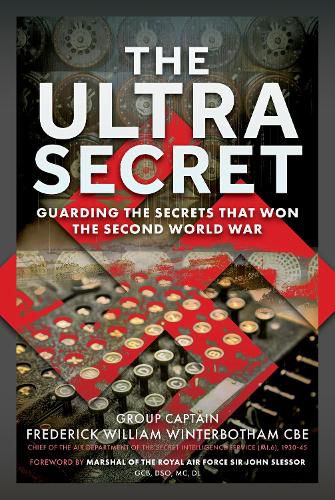Readings Newsletter
Become a Readings Member to make your shopping experience even easier.
Sign in or sign up for free!
You’re not far away from qualifying for FREE standard shipping within Australia
You’ve qualified for FREE standard shipping within Australia
The cart is loading…






In April 1940, when British cryptographers at Bletchley Park decrypted some German air force messages, Group Captain Frederick Winterbotham recognized the potential of such intelligence and established a secure system to handle it. He created Special Liaison Units, small teams of RAF officers and enlisted men, to receive and securely distribute decrypted Ultra messages to relevant commanders. These messages, transmitted through encrypted radio signals, were kept highly classified, with recipients unaware of their origins. Winterbotham's units played a critical role in key moments during the war. His selected intercepts provided early insights into the French collapse during the Battle of France and proved crucial in the Battle of Britain, North Africa, El Alamein, and the D-Day invasion. The Ultra intelligence was vital for informing Allied military decisions, with Winston Churchill receiving urgent messages directly via a secure phone line. By 1944, the system was highly efficient, delivering time-sensitive information, such as the rapid intelligence on the German evacuation of the Casino line in Italy. Winterbotham also analyzed the surprise of the 1944-45 Ardennes Offensive, noting that the absence of German signals should have raised alarms. Winterbotham's first-hand account of the Enigma program offers an unmatched perspective on its strategic importance. AUTHOR: Born on 16 April 1897, FREDERICK WILLIAM WINTERBOTHAM was educated at Oxford University. In the First World War he transferred to the Royal Flying Corps, but was shot down over the Western Front in 1917, spending the rest of the war in captivity. Early in 1930, Winterbotham joined the Air Staff and was officially assigned a role as a liaison officer; unofficially he served in the Air Department of the British Secret Service. On the outbreak of the Second World War, he established a new organisation for the translation, distribution and security of Ultra at Bletchley Park. In 1943 he was awarded the CBE, and attained the rank of Group Captain. He died of natural causes on 28 January 1990, aged 92. 16 b/w illustrations
$9.00 standard shipping within Australia
FREE standard shipping within Australia for orders over $100.00
Express & International shipping calculated at checkout
In April 1940, when British cryptographers at Bletchley Park decrypted some German air force messages, Group Captain Frederick Winterbotham recognized the potential of such intelligence and established a secure system to handle it. He created Special Liaison Units, small teams of RAF officers and enlisted men, to receive and securely distribute decrypted Ultra messages to relevant commanders. These messages, transmitted through encrypted radio signals, were kept highly classified, with recipients unaware of their origins. Winterbotham's units played a critical role in key moments during the war. His selected intercepts provided early insights into the French collapse during the Battle of France and proved crucial in the Battle of Britain, North Africa, El Alamein, and the D-Day invasion. The Ultra intelligence was vital for informing Allied military decisions, with Winston Churchill receiving urgent messages directly via a secure phone line. By 1944, the system was highly efficient, delivering time-sensitive information, such as the rapid intelligence on the German evacuation of the Casino line in Italy. Winterbotham also analyzed the surprise of the 1944-45 Ardennes Offensive, noting that the absence of German signals should have raised alarms. Winterbotham's first-hand account of the Enigma program offers an unmatched perspective on its strategic importance. AUTHOR: Born on 16 April 1897, FREDERICK WILLIAM WINTERBOTHAM was educated at Oxford University. In the First World War he transferred to the Royal Flying Corps, but was shot down over the Western Front in 1917, spending the rest of the war in captivity. Early in 1930, Winterbotham joined the Air Staff and was officially assigned a role as a liaison officer; unofficially he served in the Air Department of the British Secret Service. On the outbreak of the Second World War, he established a new organisation for the translation, distribution and security of Ultra at Bletchley Park. In 1943 he was awarded the CBE, and attained the rank of Group Captain. He died of natural causes on 28 January 1990, aged 92. 16 b/w illustrations